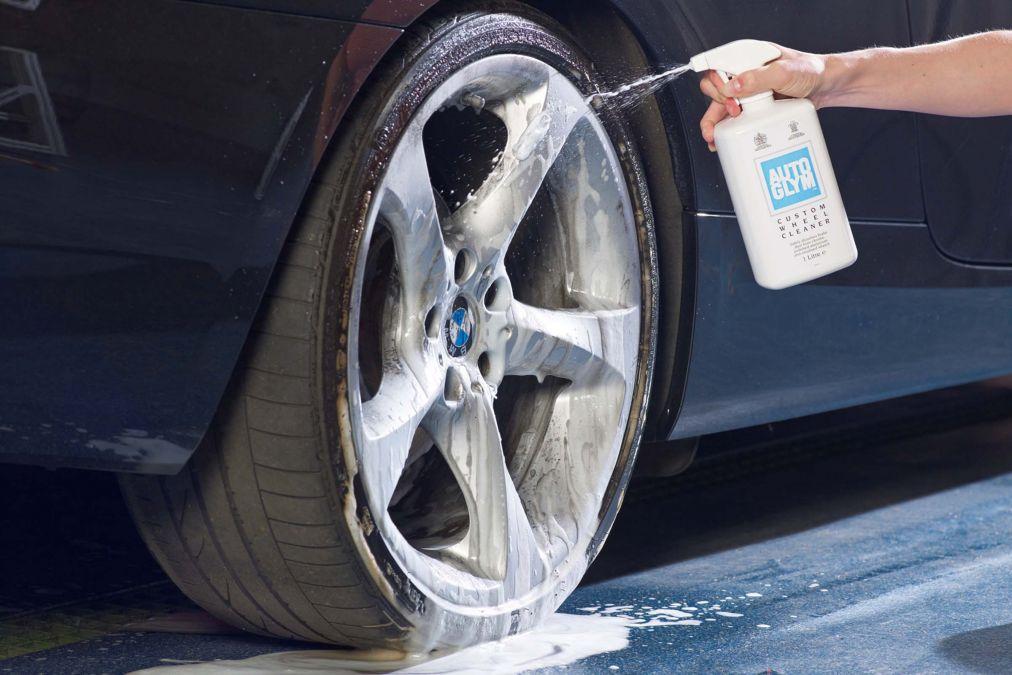Maintaining clean and polished wheels enhances your vehicle’s appearance and overall well-being. Proper wheel cleaning keeps your wheels looking great and helps prevent potential damage.
Here’s a step-by-step guide on how to properly clean and polish your car’s wheels:
1. Gather Your Supplies
Before you begin, gather the necessary supplies to ensure an efficient and safe cleaning process. Here’s what you’ll need:
- Wash Bucket
- Microfiber wash mitt
- Scratch-proof soft bristle wheel brush
- Dedicated wheel cleaner spray (non-acidic)
- Degreasing or wax-stripping automotive shampoo (if you have non-ceramic coated wheels)
- pH-neutral, wax-free automotive shampoo (if you have ceramic-coated wheels)
2. Spray Wheels with Water
Start by spraying your wheels with water. If possible, use a high-pressure washer to remove loose contaminants effectively. If you don’t have access to a high-pressure washer, use a spray nozzle attached to your hose to apply pressurized water. This step helps loosen and remove surface debris.
3. Apply Wheel Cleaner
Select a suitable wheel cleaner spray, ensuring it is non-acidic. Follow the manufacturer’s instructions precisely. Some wheel cleaners are spray-and-rinse, while others require agitation with a wheel-cleaning brush. Ensure that you cover all areas of the wheel, including the spokes, rim, and inside the wheel.
4. Wash Wheels with Automotive Shampoo
After using the wheel cleaner, it’s essential to wash your wheels with an automotive-specific car washing soap or shampoo. This step helps remove any remaining chemical residue and leaves your wheels clean and free from contaminants. Choose the appropriate shampoo based on your wheel’s coating:
- For ceramic-coated wheels, use a pH-neutral, wax-free shampoo designed for ceramic-coated surfaces.
- To ensure thorough cleaning, use a wax-stripping or decontamination car wash shampoo for non-ceramic coated wheels.
5. Rinse Thoroughly
Rinse your wheels thoroughly, completely removing all soap and cleaning residues. Pay attention to the inside of the wheels and wheel wells, as soap or debris may have splattered onto suspension or brake parts.
6. Wash the Rest of Your Vehicle
Now that your wheels are clean wash the rest of your vehicle using separate supplies to prevent cross-contamination. Follow your usual car washing routine to ensure your entire vehicle looks its best.
Additional Tips:
- Regular Maintenance: Washing your wheels every time you clean your car can help reduce brake dust buildup, making future cleaning tasks easier.
- Nano Ceramic Coating: Applying a DIY nano ceramic coating to your wheels can simplify cleanup and reduce brake dust adhesion, minimizing the need for harsh chemical cleaners.
Properly cleaning and maintaining your car’s wheels preserves their appearance and contributes to your vehicle’s overall longevity and performance. Always follow the manufacturer’s recommendations for wheel cleaning products, and be mindful of the type of wheels you have to avoid damage during cleaning.
Conclusion
Properly cleaning and polishing your car’s wheels is about aesthetics and preserving their condition and ensuring your vehicle’s overall well-being. By following the steps outlined in this guide, you can maintain clean and attractive wheels while minimizing the risk of damage. Whether your wheels are ceramic-coated or not, using the right products and techniques will help you achieve the best results.
Regular wheel maintenance can also make future cleaning tasks easier and more efficient, reducing brake dust adhesion and contaminants.
Remember to use dedicated supplies for wheel cleaning to avoid cross-contamination with other vehicle surfaces. Consider applying a DIY nano ceramic coating to your wheels for long-lasting protection and easier cleanup.
FAQs (Frequently Asked Questions)
1. Can I use any wheel cleaner for my car’s wheels?
- No, it’s essential to choose a wheel cleaner that is suitable for your specific wheel type. Non-acidic, pH-neutral wheel cleaners are generally safe for most wheels. Follow the manufacturer’s recommendations and guidelines for the best results.
2. How often should I clean my car’s wheels?
- Regular wheel cleaning is recommended each time you wash your car, especially if you live in an area with significant brake dust buildup. This practice helps prevent the accumulation of contaminants and makes future cleaning tasks more manageable.
3. Can I use a high-pressure washer to clean my wheels?
- High-pressure washers can be effective for removing loose contaminants from wheels. However, be cautious with their use, as too much pressure or getting too close to the wheel’s surface can damage certain wheel types or coatings.
4. Are wheel cleaning brushes necessary?
- Wheel cleaning brushes, particularly soft bristle ones, can be valuable tools for agitating and removing stubborn contaminants from wheels. They help ensure a thorough and safe cleaning process, especially in hard-to-reach areas.
5. What’s the advantage of using a nano-ceramic coating on wheels?
- A nano-ceramic coating creates a protective layer on your wheels, making them more resistant to contaminants and brake dust adhesion. This simplifies future cleaning and enhances the wheels’ durability and appearance.
6. Can I use wheel cleaner on all wheel parts, including the brake calipers?
- No, it’s crucial to avoid getting wheel cleaner on brake calipers or other sensitive brake components. Some wheel cleaners can be harsh and may damage these parts. Use a dedicated brake caliper cleaner if necessary and take precautions to protect these areas during wheel cleaning.
